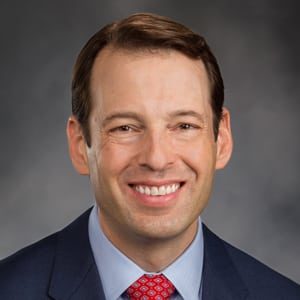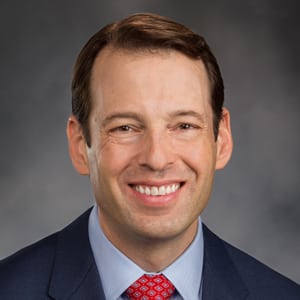
Home » How will state’s new campaign finance laws affect nonprofits?
How will state’s new campaign finance laws affect nonprofits?

August 14, 2018
State Democratic Sen. Andy Billig of Spokane finally got his way against “dark money” in the 2018 legislative session.
After several years of introducing legislation to strengthen Washington state’s campaign finance laws, lawmakers in Olympia passed the Disclose Act earlier this year with the help of a Democratic-controlled Senate.
The legislation targets nonprofits in the state that donate large amounts of campaign money to candidates or ballot initiative campaigns, as well as those participating in campaign activities themselves.
The new law stipulates that if a nonprofit organization plans to spend $25,000 or more in a calendar year directly on or donate to a campaign, then they must register with the PDC. In addition to registering, nonprofits must disclose their top 10 donors, who give $10,000 or more.

Washington state voters supported campaign finance reform in 1972 when they approved ballot initiatives to require reporting and regulation of campaign finance donations. The law left a loophole, however, that Billig asked lobbyists and consultants how to close.
“It was a flaw in our legal system. They (consultants) said, ‘Well it’s easy, I would find a nonprofit that’s sort of on the same topic and I would help them to raise money,’ ” Billig said.
In 2012, a ballot initiative that would have required labels on the front of genetically modified foods in the state lost by a 54-48 percent vote margin. The “No on I-522” campaign against the initiative brought in $22 million in donations, The Seattle Times reported.
The Grocery Manufacturers Association, the largest donor to the “No” campaign, spent $11 million, and Attorney General Bob Ferguson brought a separate lawsuit against the group.
The association was not in violation of Washington state’s campaign finance laws at the time, however, because it was not required to disclose its donors as a 501(c)(6) organization.
Ferguson’s lawsuit eventually revealed the donations to GMA included corporations like PepsiCo, which gave $1.6 million and $1 million from Nestle and Coca-Cola to defeat the initiative. During the election, the sources of these donations were blocked, however, which the Disclose Act will change.
“It’s essential that voters be informed,” Billig said. “And when they see an advertisement, it’s important for them to know who’s paying for that ad, so they can understand the lens in which it’s supported.”
The updated Disclose Act creates a new committee, called an “incidental committee,” that will have to register with the Public Disclosure Commission, including nonprofits if they participate in campaigning within certain limits.
Currently, if a nonprofit donates to a campaign or a political action committee, their donors are not reported. While the new law will increase transparency in campaign donations, some organizations raised free speech concerns about the proposal.
Daniel Mead Smith, president at the independent think tank Washington Policy Center, said his organization, as well as the ACLU of Washington state, spoke against the legislation during the session.
“It just limits people’s free speech on different policy issues, and the government is now deciding what’s considered political speech and what isn’t,” Smith said.
During the 2018 legislative session, Paul Guppy, vice president for research at the policy center, spoke to a Senate committee about his concerns.
“Free speech is not a loophole, so when people get together to support a cause in which they believe, they shouldn’t have to register with the state,” he said in Olympia on Jan. 10.
Smith also said his group believes the bill is too broad in how it could impact organizations, especially nonprofits that do advocacy work. Some larger nonprofits have separate 501(c)(3) and 501(c)(4) organizations to distinguish between political and non-political work, but not all do.
Federal IRS rules prohibit 501(c)(3)s from doing any work on political candidate campaigns, but the new Disclose Act would also apply to nonprofit organizations advocating for or against a ballot initiative in a state or a local election. Under the new law, some activities could be considered a “campaign activity,” Smith said, leading to his group’s concerns.
The Washington Policy Center also does not support the donor disclosure part of the legislation.
“A lot of donors don’t want their name to appear anywhere, especially not on a government website that can be searched by other people,” Smith said. “So they might not mind listing it in the event program, but a lot of donors don’t like their names listed at all. And then their donation is now listed as a campaign contribution, and that’s not why they’re making the contribution.”
Billig said the law would force organizations to be transparent with their donors and in turn with voters. He spoke with nonprofits as he drafted the legislation and said those leaders told him it is difficult to raise money for politics.
“They told me … people don’t want their names associated with politics, that’s why we do it this way, and I said, ‘Precisely, that’s exactly why we need this bill,’ ” Billig said.
“They are intentionally trying not to have their names associated with it even though they are providing the money. And then they (organizations) would say, well some of these people don’t even know their money is going to politics, and I said, ‘That’s even a better reason to have the bill,’ ” he continued. “ ‘You know, you’re not even being honest with your people of how you’re raising the money and putting it into politics. This is dark money.’ ”
Not all organizations are worried about the new legislation.
Paul Dillon, vice president of public affairs at the Planned Parenthood of Greater Washington and North Idaho, or PPGWNI, said his organization supports the changes to the Disclose Act because the more transparency for voters, the better.
He said the Planned Parenthood of Greater Washington and North Idaho Advocates, the group’s 501(c)(4), would be affected by the new rules—not the 501(c)(3) which is the group’s health centers and education services. The advocacy arm of PPGWNI is the part of the group that advocates for policies at the capitol or endorses candidates. Dillon said he does not foresee any problems with donors if their identities are exposed through the new reporting rules.
“I think that our donors and supporters absolutely support people knowing who’s influencing our elections and strengthening our democracy,” Dillon said.
The Disclose Act does not impact groups doing policy work that analyze or educate the public about legislation, like the Washington Policy Center. If the material advocates for a “yes” or “no” vote, however, such ads would qualify the nonprofit running them as an “incidental committee.”
Billig said the ultimate point of the law is to get organizations that plan to do political work to register as a PAC through the state’s campaign finance system.
“The goal is that organizations that don’t have a political committee actually form one,” he said.
Still, Smith said he is concerned about the impact this could have on donors.
“We’re worried that it’s going to, you know, change civic engagement and that people are going to be less interested in voicing opinions and engaging on policy issues,” he said.
LoAnn Ayers, CEO and president of United Way of Benton and Franklin Counties, said her group works with hundreds of local 501(c)(3) groups to financially support them as well as provide direct deposits from donors. She said some of their member organizations that do advocacy work will need to learn about the new rules, and United Way’s role will largely be educational.
On the whole, however, she does not think the law will impact too many local groups.
“I think in this community — and I may be naïve — but it will be the exception to the rule,” she said.
The PDC will write the new rules to implement the Disclose Act this fall, and the law goes into effect in January 2019. The new rules will apply to the 2019 elections.
Local News Charitable Giving & Nonprofits Nonprofits
KEYWORDS august 2018




